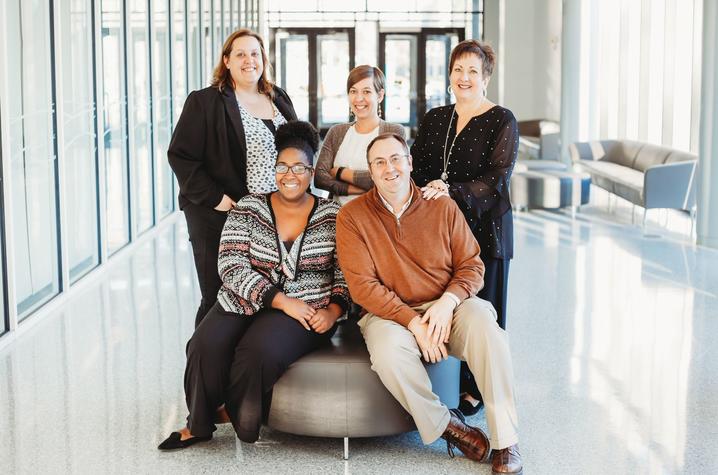UK College of Education's 'What School Could Be Academy' Helps Schools Leverage Pandemic Changes

LEXINGTON, Ky. (July 28, 2021) — A University of Kentucky team is linking with a nationally-known education innovator to help educators move beyond what school was before the COVID-19 pandemic.
The UK College of Education’s Center for Next Generation Leadership is offering the What School Could Be Academy. Supported by Ted Dintersmith, a leader in innovation, entrepreneurship and education, the academy is open to educators who want to help their schools go beyond learning as we’ve known it for the past century.
The UK team has been working with Kentucky school leaders for more than a decade and now hope to help educators across the U.S. leverage changes accelerated by the COVID-19 pandemic.
“The system of schooling we have been operating in the U.S. has gone largely unchanged since the Industrial Era. Yet, nearly every aspect of learning has faced rapid change during the pandemic. This is a once-in-a-generation opportunity to upgrade our learning models that were previously difficult to implement against the inertia of our existing systems of schooling,” said Justin Bathon, associate professor and chair of Educational Leadership Studies in the UK College of Education and director of the UK Next Generation Scholars program.
Dintersmith made a mark in K-12 education as executive producer of the 2015 documentary "Most Likely to Succeed" and the book he co-authored with Tony Wagner, "Most Likely to Succeed: Preparing Our Kids for the Innovation Era." The book and documentary examine education in America and have inspired school communities to re-imagine an education system that prepares students for careers in a transformed world economy.
“Coming out of the pandemic, with the support of unprecedented federal dollars, school leaders should not seek to reopen schools in the fall the same way we have always run them. Instead, we should be seeking to operate schools ‘better than normal’ and the path forward toward deeper learning models of school is clearly established,” Dintersmith said.
The UK Center for Next Generation Leadership’s academy carries the name of Dintersmith’s follow-up book and ongoing initiative, "What School Could Be: Insights and Inspiration from Teachers Across America." The academy will be housed in the What School Could Be Community, a growing, global network of educators seeking new models. Participants in the academy — comprised of teachers and school leaders across the U.S. — will explore ways they can, within their unique school environments, implement deeper learning entry points.
“Each school enters the work differently, but helping Kentucky schools has shown us common entry points that can be successful and the broad scope of how leadership teams successfully begin to transition a school. Whether a school implements relatively small steps like a Genius Hour in a single classroom or larger shifts in competencies and assessments, the key is just to start. Once begun, most experienced educators begin to notice the difference and that drives further innovation thereafter,” said Bathon, who is co-author of the new book "Leadership for Deeper Learning: Facilitating School Innovation and Transformation."
The What School Could Be Academy will be led by a UK team with decades of collective experience both practicing leadership for deeper learning as well as conducting research on school leadership. It will also feature guest instructors from deeper learning leadership organizations across the country. It is based on the yearlong UK Next Generation Leadership Academy, which has supported Kentucky school teams in taking tangible early steps toward deeper learning models.
In addition to the national What School Could Be Academy, the Kentucky Leadership Academy is also growing and will be offered in three different versions in 2021-22. The 11th year of the statewide version will be supplemented by the fifth year of the Jefferson County Academy with a new Western Kentucky Academy starting this year in partnership with the Green River Regional Educational Cooperative.
Meeting virtually eight times throughout the year, school implementation teams will build their knowledge base of deeper learning practices, build local empathy through student interviews, choose a deeper learning entry point, implement a change initiative during the year, and share the results of the effort in Spring 2022.
“We are really excited to partner with Ted Dintersmith and the What School Could Be community to use this moment in the wake of the COVID-19 pandemic to be bold. We have now seen how some of the known limitations of our schools impact our most vulnerable students the most. There is a better way and together we can make those changes for our children,” Bathon said.
As the state’s flagship, land-grant institution, the University of Kentucky exists to advance the Commonwealth. We do that by preparing the next generation of leaders — placing students at the heart of everything we do — and transforming the lives of Kentuckians through education, research and creative work, service and health care. We pride ourselves on being a catalyst for breakthroughs and a force for healing, a place where ingenuity unfolds. It's all made possible by our people — visionaries, disruptors and pioneers — who make up 200 academic programs, a $476.5 million research and development enterprise and a world-class medical center, all on one campus.




